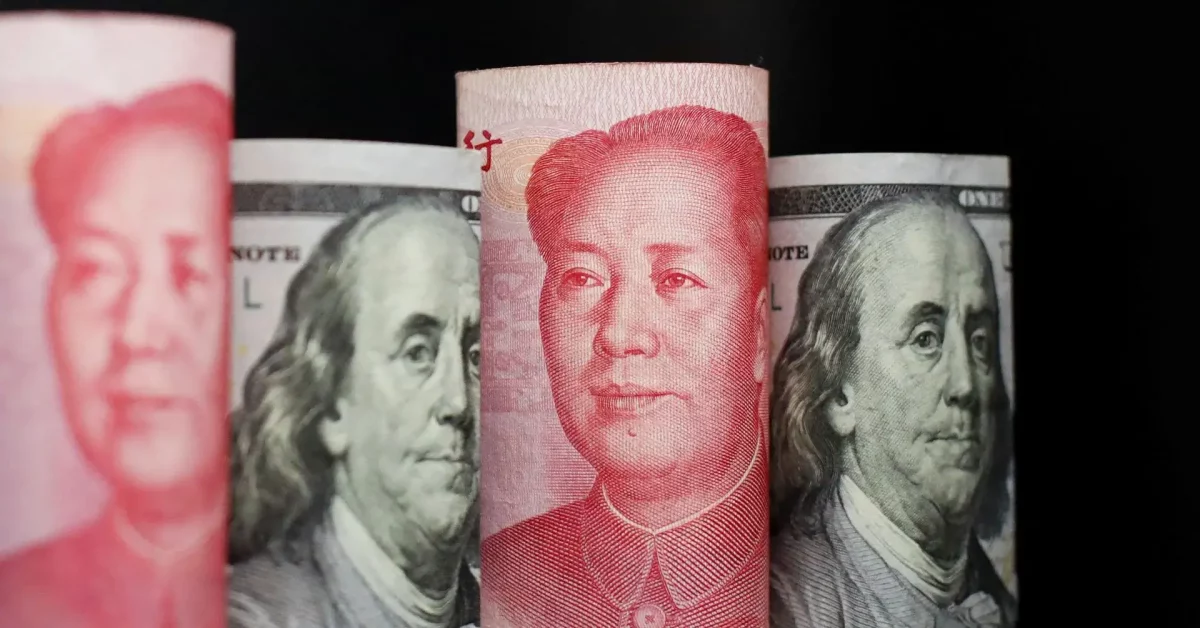China Expands Yuan’s Global Reach With Record Settlements and QR Payments
12.05.2025 21:00 2 min. read Alexander Stefanov
China is making quiet but decisive moves to elevate the yuan’s status in global finance, leveraging recent geopolitical shifts and trade negotiations to boost the currency’s reach.
Following the recent U.S.-China trade agreement signed in Geneva, the yuan saw a surge in international activity, with cross-border settlements hitting a record 4.3 trillion yuan in Q1 alone.
Analysts suggest the demand for the yuan is steadily growing, surpassing that of other local currencies. Though it still trails far behind the dollar or euro in global dominance, the Chinese government’s efforts to internationalize the yuan are gaining traction, especially in emerging markets.
In a bid to make spending in yuan seamless beyond its borders, China has rolled out UnionPay QR-code payment systems across nearly 30 countries, primarily in Southeast Asia. This move enables tourists and merchants in those nations to transact in yuan with the ease of scanning a code—further embedding the currency in everyday commerce.
What began as a tightly controlled currency for internal use is now evolving into a tool for international payments—even for commodities. According to reports, the People’s Bank of China is preparing to introduce yuan-based QR payments for settling trades in goods such as oil, metals, and gold. If fully implemented, this could represent a major shift in how global commodities are priced and traded.
Beijing’s long-term goal appears clear: reduce reliance on the U.S. dollar and carve out a larger role for the yuan in the global financial system. With digital tools and trade diplomacy working in tandem, the yuan is steadily positioning itself for a broader role on the world stage.
-
1
Robert Kiyosaki Predicts 2025 “Super-Crash,” Urges Hoarding Gold, Silver, and Bitcoin
23.06.2025 13:31 2 min. read -
2
Billionaire Slams Meme Stock Hype and Sounds Alarm on U.S. Fiscal Health
15.06.2025 18:00 2 min. read -
3
Billionaire Investor Sees Dollar Crash If Key Support Breaks
18.06.2025 15:00 1 min. read -
4
Nassim Taleb Says Global Trust Is Shifting from the Dollar to Gold
22.06.2025 17:00 1 min. read -
5
Geopolitical Shockwaves Hit Ethereum Hard While Bitcoin Stays Resilient
22.06.2025 16:21 1 min. read
Robert Kiyosaki Predicts When The Price of Silver Will Explode
Robert Kiyosaki, author of Rich Dad Poor Dad, has issued a bold prediction on silver, calling it the “best asymmetric buy” currently available.
U.S. PCE Inflation Rises for First Time Since February, Fed Rate Cut Likely Delayed
Fresh data on Personal Consumption Expenditures (PCE) — the Federal Reserve’s preferred inflation gauge — shows inflation ticked higher in May, potentially delaying the long-awaited Fed rate cut into September or later.
Trump Targets Powell as Fed Holds Rates: Who Could Replace Him?
Federal Reserve Chair Jerome Powell is once again under fire, this time facing renewed criticism from Donald Trump over the Fed’s decision to hold interest rates steady in June.
U.S. National Debt Surge Could Trigger a Major Crisis, Says Ray Dalio
Billionaire investor Ray Dalio has sounded the alarm over America’s soaring national debt, warning of a looming economic crisis if no action is taken.
-
1
Robert Kiyosaki Predicts 2025 “Super-Crash,” Urges Hoarding Gold, Silver, and Bitcoin
23.06.2025 13:31 2 min. read -
2
Billionaire Slams Meme Stock Hype and Sounds Alarm on U.S. Fiscal Health
15.06.2025 18:00 2 min. read -
3
Billionaire Investor Sees Dollar Crash If Key Support Breaks
18.06.2025 15:00 1 min. read -
4
Nassim Taleb Says Global Trust Is Shifting from the Dollar to Gold
22.06.2025 17:00 1 min. read -
5
Geopolitical Shockwaves Hit Ethereum Hard While Bitcoin Stays Resilient
22.06.2025 16:21 1 min. read


